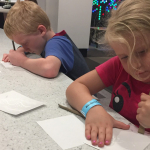Hardest questions, toughest moments

Somewhere, far, far away, there lies an obscure stone carved with this universal truth for parents, grandparents, and adult friends: Children will ask life’s hardest questions at the precise moments in which you are least prepared to answer them. Straighten your back, and get ready.
And I might scratch on this codicil: the older the children get, the wider that gap. The most inconvenient circumstances or seemingly harmless moments yield queries which, if fumbled, you fear could misdirect a child forever. OK, perhaps one shouldn’t get carried away with notions about the extent of one’s own influence. Maybe not forever, but you get the idea.
Not long ago I was driving Buddy and Sis (now seven and five, respectively) somewhere while generally tuning out the rising level of dialogue audio floating my way from the back seat. The tune-out thing is an essential, acquired skill, because vigorous debate between these two occurs about as frequently as breathing. If they are not arguing, on some days, they are probably asleep. Yet suddenly my attention was arrested when Sis fired my way a pointed, insistent question:
“Evie! Do you believe God?”
Literate thinker and lifelong proofreader that I am, I was momentarily thrown by her sentence structure. Had some pronouncement appeared from the Almighty requiring an immediate verification? (Maybe from the cartoon God guy illuminated on the theater ceiling on The Late Show with Stephen Colbert? Give it up for God, everybody! commands the comedian, a lifelong Catholic, to the crowd when Cartoon God appears above their heads. Applause would indicate God has more than a few fans in the audience. But do I believe what he said?)
Ah, no, wrong track here. Despite Sis having curiously dropped the word “in”, she actually was asking me: Do you believe in God?
ACK! The car continues rolling steadily through traffic, and I am driving. Keep hands on the wheel, eyes pointed forward, I instruct Me. Waste no energy at this crucial moment on amazement that a five-year-old spouts this question from her car seat apropos of nothing I can discern (see reference to “tune out” above) on a routine weekday afternoon.
This self-command to focus was accompanied by a tingling chill of apprehension as I contemplated my answer. If ever the right choice of words could leave an indelible imprint on a young heart and mind, this might be the time.
What do you say to a five-year-old in response to a question that has altered history since time immemorial? A concept that has caused wars, changed governments, divided families, rewoven the fabric of society in our nation and so many others? What’s my job here: Affirmation? Persuasion? Historical context? Toe the line articulated by the parents?
Shouldn’t there be a grandparent instruction book somewhere on this topic? Why wasn’t I warned this question would come so soon?
My thoughts drifted back to Sis’ question Sunday afternoon as I sat in a church pew, listening intently at the funeral of the husband of an old friend. This gentleman was a third-generation church member who contributed extraordinary effort to the well-being of the church—no fewer than four robed clergy shared the dais to testify to that history—but those references were not the things, at least to me, that delivered the most powerful elements of his life story.
Rather, it was the visible and tangible evidence of the life he lived outside the church that spoke so clearly about him as a man of faith. It was the demonstrative affection his family members showed each other as they filed into and out of the sanctuary. It was watching two sisters hold hands as they approached the lectern to share their joint reflections about their father. It was hearing the pastor note that the family had agreed to also stay and receive mourners after the service, as the line had been so long beforehand that time ran out for the family to greet all who came to pay their respects.
Perhaps the most moving recollection, though there were so many, was the bishop recalling that the gentleman became “more inclusive the older he got.” He worked as a dentist, and they shared that he was appalled to learn some of his fellow practitioners were turning away gay patients at the height of the AIDS epidemic. And so he became known as one dentist who welcomed all who needed him. He brought that spirit into the church, helping the church move through a process of formally identifying itself as a church home that was open to all, regardless of orientation.
Finally, the pastor delivered one of the most striking parallels to the example lived by Christ that I’ve ever heard spoken about a single individual. In honoring the gentleman’s open affection for people, his natural instincts to respect and support his family, his friends, his patients, his church family, his wife had described him to the pastor like this: “He just thought everybody was his.”
Everyone listening was offered this inspiring illustration of the impact of actions as testimony to belief. It’s a tenet often taught and discussed in houses of faith, but I wondered as I listened how many times we are gifted with real-life examples of how that works. Today’s public discourse is so barbed with extremism, hidebound by rigidity. The journey of believers can be made infinitely more difficult, seemingly impossible, by such things. What if, instead of telling people what they should think and what they should and shouldn’t do, we testified by living like my friend—by loving and supporting others as if they were ours?
That reflection sparked a small hope that my spare but firm answer to Sis’ question back in the car that day may have, after all, been acceptable. I agonized about it afterward, wondering if I should have embellished it, could have told some story, should have something more eloquent and specific to help a five-year-old understand. But listening to the stories I heard that afternoon reminded me that as her grandmother, my best chance to demonstrate faith will be through the humdrum, sometimes unimportant choices of daily life. That’s no small challenge, and no small privilege. But it won’t come from one answer, one hot summer day, to one pointed question from one eager little girl.
Because all I said was this: “Yes. Yes, I do believe (in) God.” No questions in return. No instructions, no testimony, no promises. And I drew a deep breath when she responded, energetically (as she does with nearly everything), “Me, too!” At five, can she possibly understand what that means? Who knows?
For some reason, I left it at that. I hope it was enough. Actually, I pray it was enough.




Love this one Eve. Thank you for sharing these personal GMA moments. ????
Another beautifully written, relevant, poignant piece. Thanks, Eve!